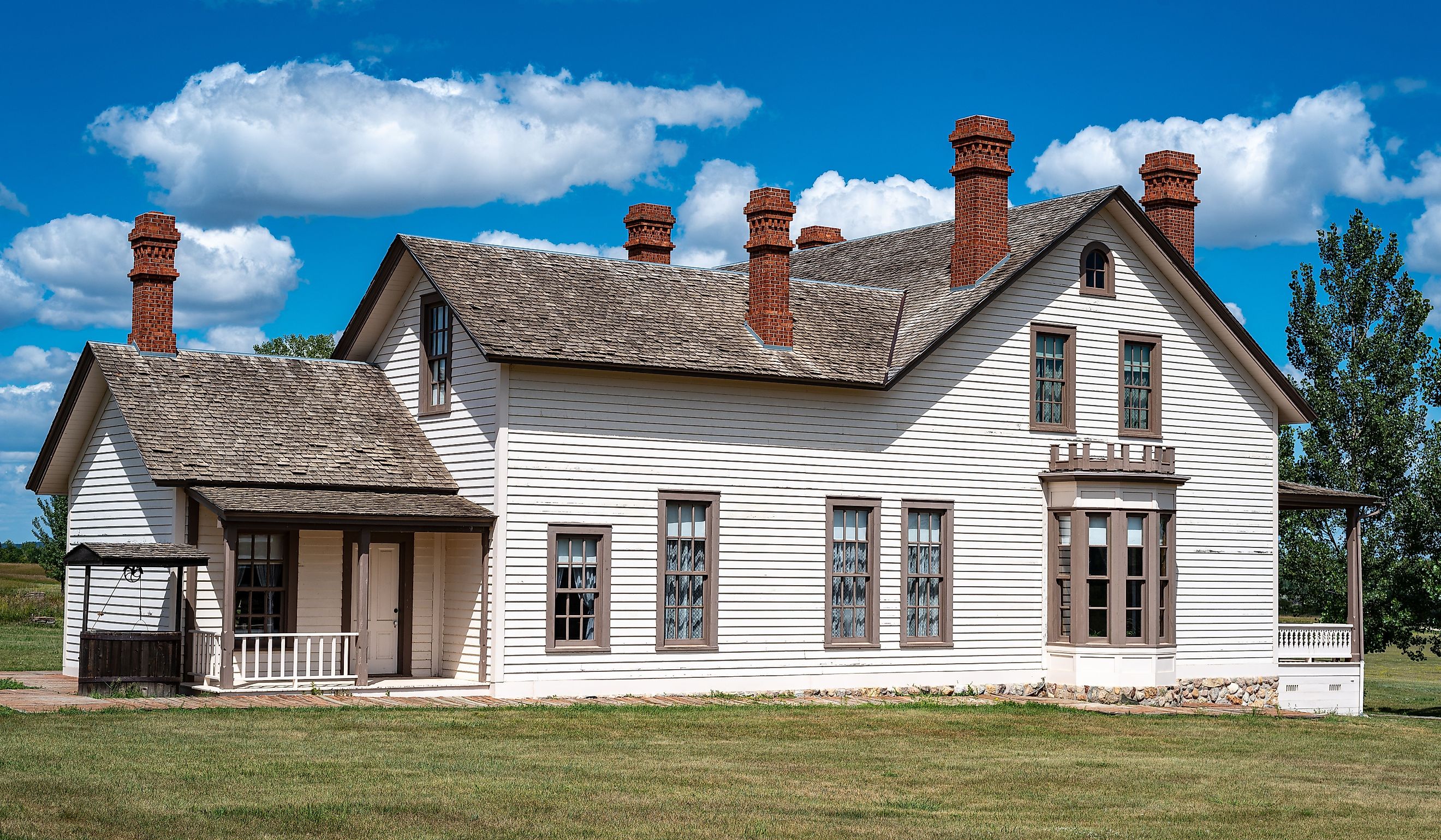
10 Oldest Founded Small Towns to Visit in North Dakota
North Dakota is a vast state. It beholds a physical beauty that covers hundreds of miles of prairies, rolling hills, expansive woodlands, and river valleys. It is not only visually stunning but is rich in history and cultural charm. North Dakota is home to small towns with roots dating decades back, with several towns beginning in the 1800s. Take a journey and find out what awaits in ten of North Dakota’s oldest-founded small towns.
Pembina
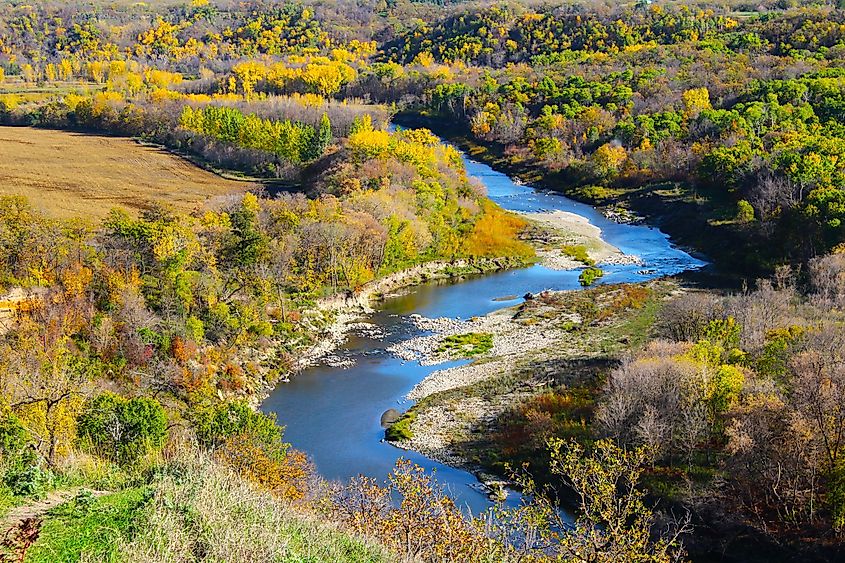
Officially founded in 1843, Pembina is North Dakota's oldest town, located on the border of the United States and Canada. The little town of Pembina is home to less than 600 people and the first European settlement in the state. It features some of North Dakota's most breathtaking scenery, with views of rolling hills, rushing rivers, various wildlife, and thick woodlands.
One of Pembina's most notable natural wonders is the nearby Pembina Gorge, revealing one of the state's deepest and steepest river valleys. Extending from the Canadian border west of Walhalla and encompassing one of the largest uninterrupted blocks of woodlands in North Dakota, the Pembina Gorge is about 12,500 acres.
Recreational opportunities in the Pembina Gorge include hiking, canoeing, horseback riding, cross-country skiing, wildlife viewing, and snowmobiling. Located on the north shore of Lake Renwick is the Icelandic State Park, offering visitors additional outdoor activities such as swimming, boating, and fishing.
For visitors looking for a little more history with their exploration of Pembina, historical sites include the Grace Episcopal Church and the Pembina State Museum.
Valley City
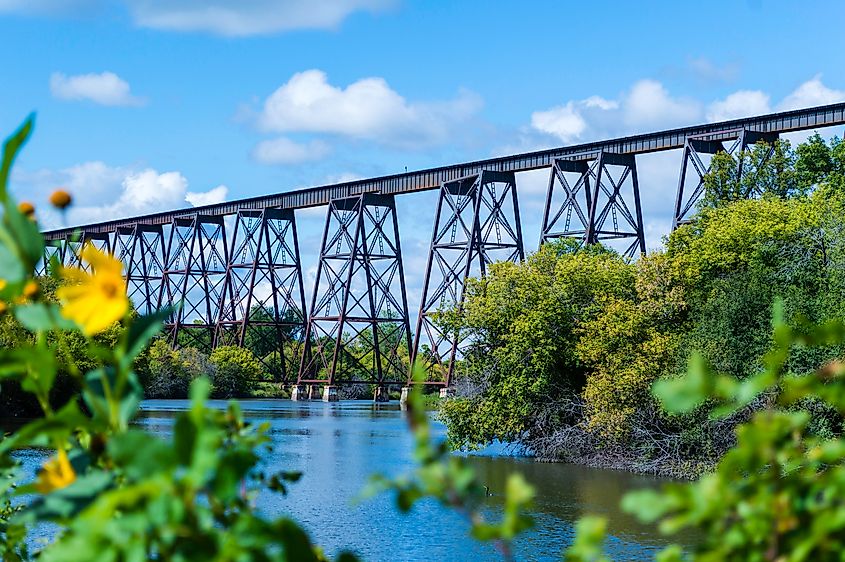
Picturesque Valley City is North Dakota’s most beautiful town. With its location in the Sheyenne River Valley, the city presents diverse natural landscapes, winding roads, and breathtaking bridges for all to see. Valley City was founded in 1872 and lies about 60 miles west of Fargo.
One of Valley City’s most sought-after attractions is North Dakota’s first nationally recognized scenic byway, the Sheyenne River Valley National Scenic Byway. The byway features award-winning interpretive panels scattered across the 63-mile drive through the Sheyenne River Valley. The drive begins north of Valley City and moves south to Kathryn, Forst Ransom, and Lisbon, revealing the culture, history, wildlife, geology, and archaeology of the region along the way.
Another must-see in Valley City is the Medicine Wheel Park, a scenic landmark from 1992 created by a professor and his class. The unique attraction encompasses 30 acres and represents the lunar cycle, sunrises and sunsets, the four seasons, and the earth’s journey around the sun.
The park is also the location of twelve Native American burial mounds, the North Country National Scenic Trail, the Walking Tour of the Solar System where boulders represent planets, and the Meridian Calendar that utilizes the length of a shadow cast by a utility pole to mark the commencement of each season.
Jamestown
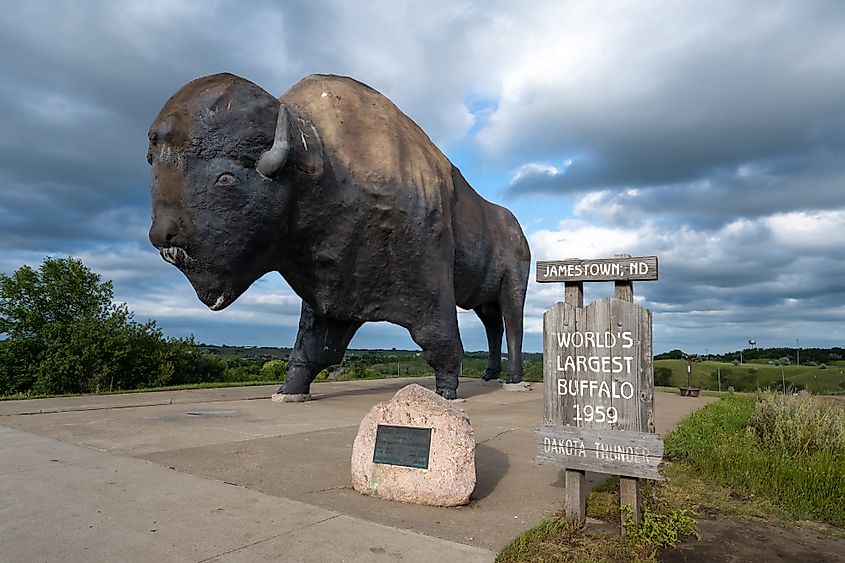
Shaking the ground with sounds like booming thunder, buffalo roamed most of North America in the early 19th century. While wild buffalo are no longer commonly seen, these massive creatures are among the plains of Jamestown, drawing thousands of visitors every year to view and learn about their history, cultural significance, and ecological impact.
Jamestown, founded in 1872, is situated between Bismarck and Fargo. The town’s North American Bison Discovery Center teaches visitors about the North American bison. At the back of the organization, individuals can view Jamestown’s live buffalo herd grazing the prairie grasses.
Nearby is the World’s Largest Buffalo monument, known as Dakota Thunder, measuring 26 feet in height and weighing about 60 tons, standing over Jamestown since 1956.
Just past the North American Bison Discovery Center is the Frontier Village, featuring the original buildings from the frontier villages of North Dakota. The site features antiques, artifacts, informative historical displays, and Western author Louis L’Amour’s writing shack.
Mandan
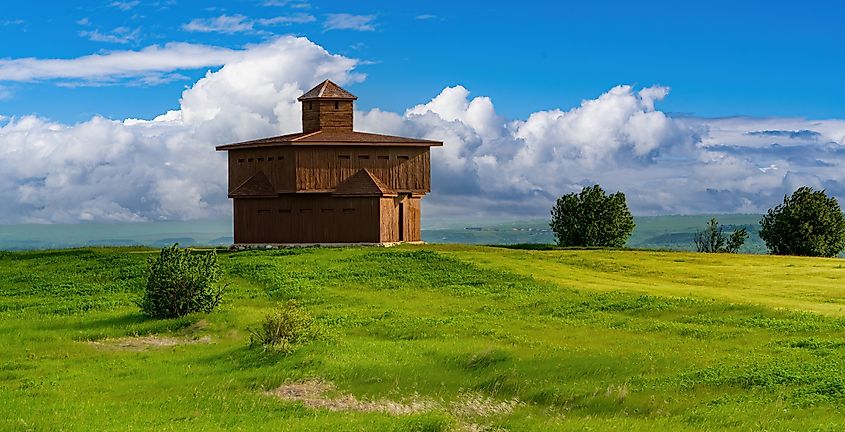
Steeped in history, Mandan is an ideal destination to dive into US military and Native American history. Mandan is part of Morton County in south-central North Dakota, founded in 1879.
The oldest state park in North Dakota, Fort Abraham Lincoln State Park, is the site of an 1875 reconstruction of General George Custer’s former residence, central barracks, commissary, granary, and stable. The park also offers hiking opportunities, trails, cabins, and camping.
In the same park, individuals can visit the On-A-Slant Village, a 400-year-old Mandan Indian Village. The site was home to the Mandan people for an estimated 200 years. The site also features five reconstructed earthlodges.
Williston
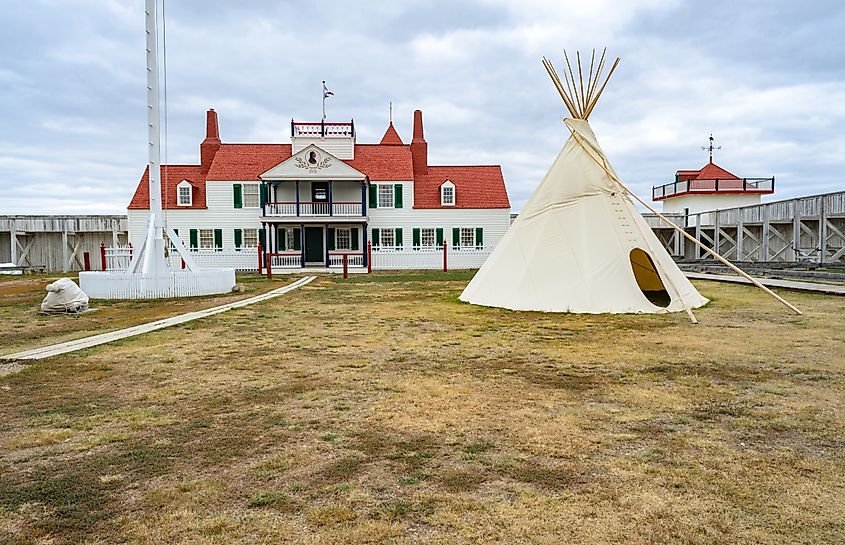
Commonly known as the Western Star, Williston is ripe with Western heritage and provides ample access to historical sites and breathtaking national and state parks. Founded in 1887, Williston is the county seat of Williams County, located at the convergence of the Missouri and Yellowstone Rivers.
Begin a visit to Williston with a stop at the Fort Union Trading Post, the historical site of the most important fur trade post on the Missouri River from 1828 to 1867. The Fort Buford State Historic Site is also worth a visit as it functions as a preservation of a frontier plains military post in 1866. The site includes an original post cemetery site, a large officers’ quarters, and a stone powder magazine.
No trip to Williston is complete without a stop at the Missouri-Yellowstone Confluence Interpretive Center, which tells the story of the Missouri-Yellowstone junction and provides the view Lewis and Clark Expedition members enjoyed in 1805 and 1806.
Rugby
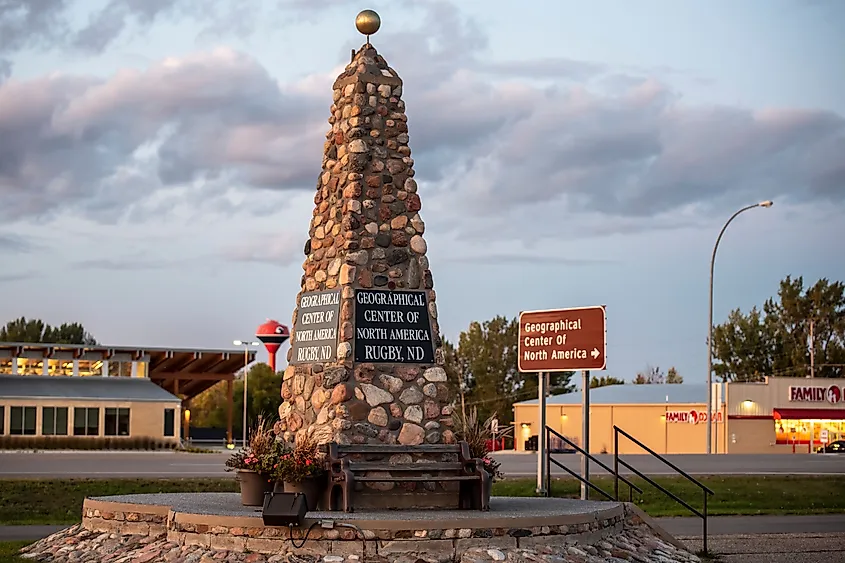
Rugby, initially founded in 1886 at an intersection on the Great Northern Railway, was originally named Rugby Junction until the community became a city. The town of Rugby considers itself the geographic center of North America. It highlights this detail with a 21-foot-high monument on a heart-shaped foundation and is named the Geographical Center of North America Monument.
Rugby’s additional unique sites include the Niewoehner Bell Tower, a 30-foot tower containing 15 large bells, some of which weigh 1,300 pounds each, all functional and heard echoing across the town. The Northern Lights Tower is another distinct feature of Rugby. The 88 ½-foot-tall steel structure is a dedication to one of the Northern Plain’s natural phenomena, the Aurora Borealis.
Dickinson
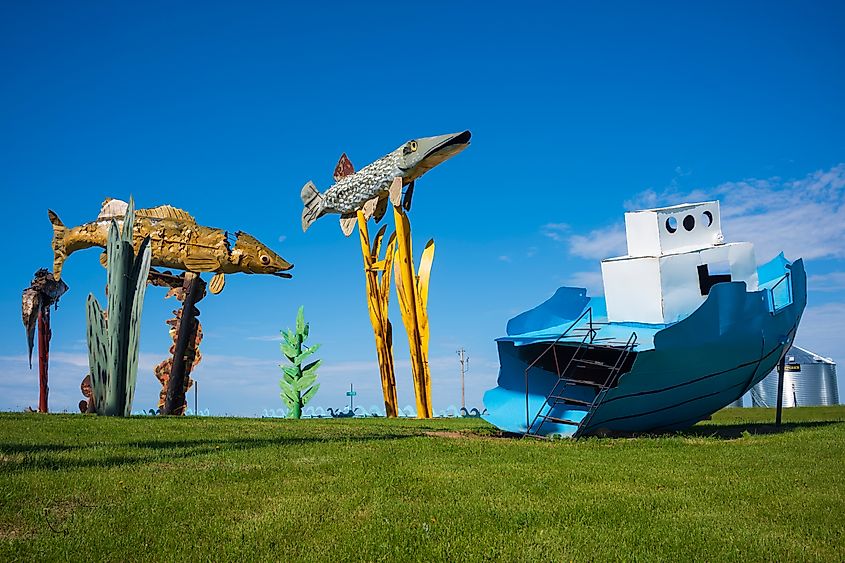
Dickinson is considered the gateway to the Theodore Roosevelt National Park and is abundant in diverse recreational opportunities. The city of Dickinson was founded in 1880 and sits in southwest North Dakota.
Lovers of history and dinosaurs will enjoy Dickinson's Badland's Dinosaur Museum. It is located in the Dickinson Museum Center, exhibiting thousands of mineral, rock, and fossil specimens from around the world, including a complete Triceratops skull.
No trip to Dickinson is complete without traversing the Enchanted Highway. The 32-mile stretch of highway showcases some of the world's largest scrap metal sculptures, with the Geese in Flight sculpture taking the title of the Guinness World Book of Records' Largest Scrap Metal Sculpture in the world.
Carrington
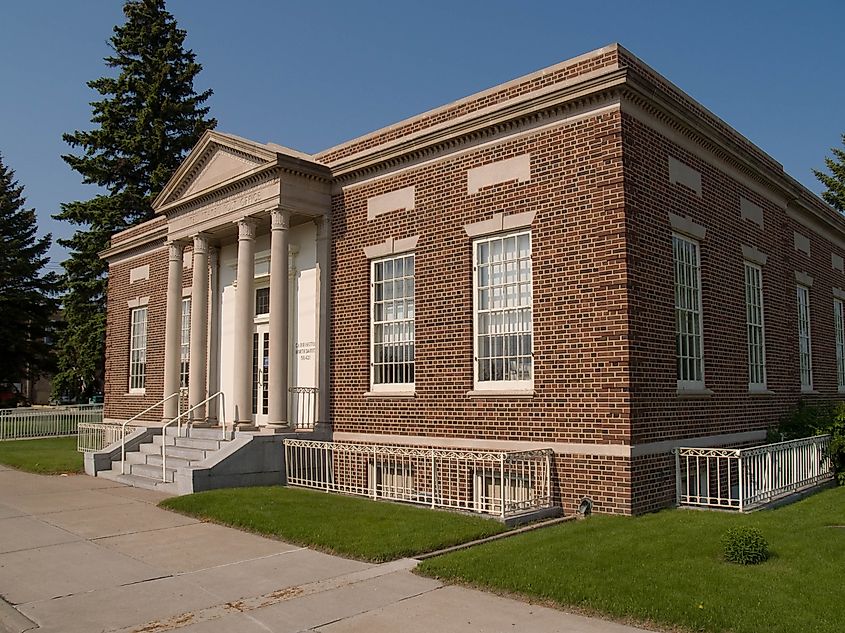
Northwest of Jamestown, in the center of the Central Flyaway, is Carrington, a city where thousands of waterfowl migrate to and from wintering sites and breeding grounds every year. Founded in 1882, Carrington is brimming with history. To learn more about the area's history, make a stop at the Foster County Museum to take a trip into the past.
End a visit to Dickinson with a dinner at the Chieftain Sports Bar attached to the Chieftain Conference Center. The center houses authentic Native American artifacts and pieces of North Dakota history. Outside, the Big Chief landmark towers above, an arm extended high in greeting.
Lisbon
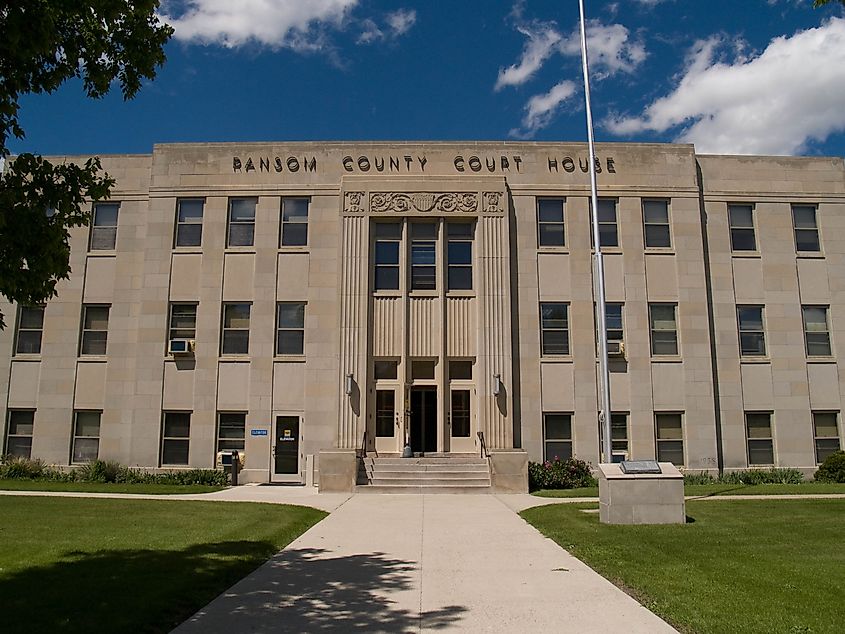
Founded in 1880, Lisbon lies in the Sheyenne River Valley southeast of North Dakota. The city is the southern point of the Sheyenne River Valley National Scenic Byway and a gateway to Fort Ransom State Park.
Through the town, the Sheyenne River flows free, and further out is the Sheyenne River State Forest, where kayakers can paddle down the stream. The forest offers views of lush greenery, including bur oak, basswood, quaking aspen, green ash, and ironwood. Back in town, individuals can visit the 1890s Lisbon Opera House and the Scenic Theater two doors down. The theater shows movies continuously and has since 1911, proclaiming to be America's oldest continuously running theater.
Devils Lake
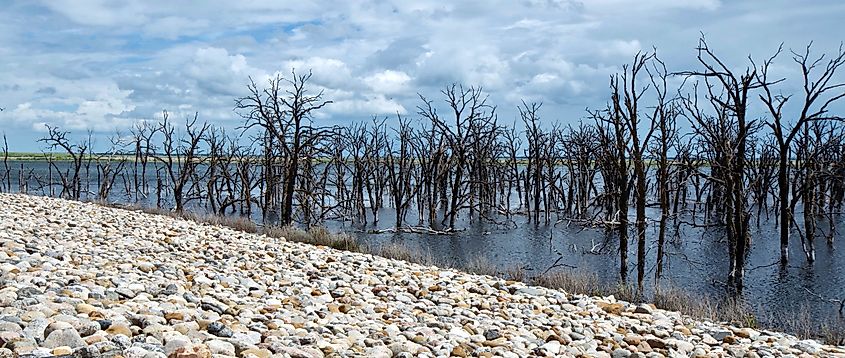
Named after the nearby body of water called Devils Lake, the small city of Devils Lake is the Perch Capital of the World. Founded in 1882, Devils Lake is home to numerous white bass, northern pike, and walleye.
One of the city's best outdoor offerings is Grahams Island State Park. The park boasts a unique landscape ideal for world-class fishing and a heavily wooded area that campers enjoy. The White Horse Hill National Game Reserve is another of Devils Lake's outdoor treasures. The refuge helps conserve the American bison, elk, prairie dogs, and many other land animals. Visitors can enjoy a hiking trail, an auto tour, or sitting quietly amongst nature.
For a little history, check out The Sheriff's House Museum. The building is furnished as a 1910-era home, showcasing artifacts from families from the Lake Region.
North Dakota is a unique state in its offerings. It is great for spending time outdoors in natural wonders like the Pembina State Gorge and Sheyenne River Valley of Lisbon. There are fascinating Native American history sites, such as the Medicine Wheel Park burial grounds and the Mandan village. The state’s cultural charm is unmatched, with some of its towns erecting monuments like the World’s Largest Buffalo to honor the buffalo. South Dakota’s oldest small towns are little pockets of history and natural beauty.











